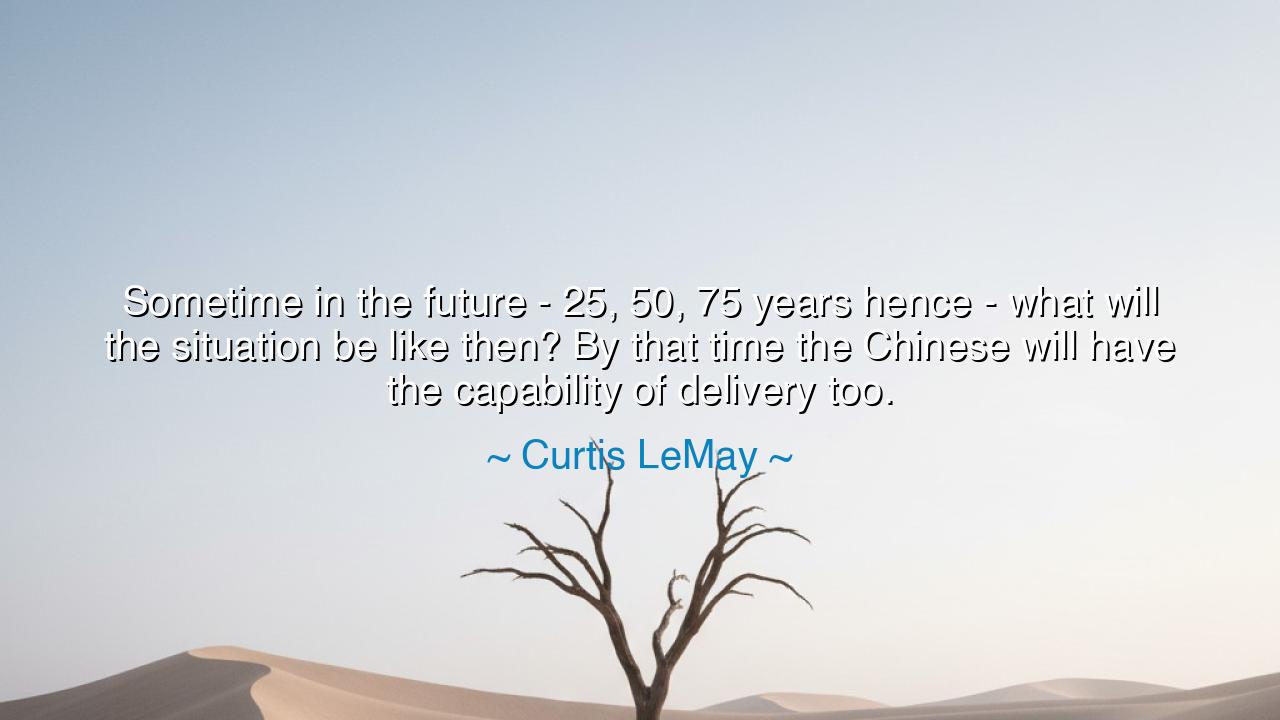
Sometime in the future - 25, 50, 75 years hence - what will the
Sometime in the future - 25, 50, 75 years hence - what will the situation be like then? By that time the Chinese will have the capability of delivery too.






"Sometime in the future - 25, 50, 75 years hence - what will the situation be like then? By that time the Chinese will have the capability of delivery too." – Curtis LeMay.
In this ominous reflection, Curtis LeMay speaks of the changing tides of global power, foreshadowing a future where nations, once seemingly far removed from military dominance, would rise to hold the very keys to the world’s most potent weapons. LeMay's words tap into the age-old theme of foresight—the understanding that the actions of today shape the world of tomorrow. With a keen eye on the future, LeMay envisions a world in which China, a nation then in the shadows of world power, would inevitably develop the capability to challenge established global powers. His statement is a call to recognize the inevitability of change, and the responsibility of leaders to act with vision and wisdom in anticipation of that change.
The ancient Greeks often spoke of the need for foresight, or pronoia, the divine gift of knowing what lies ahead. Plato, in his philosophical works, emphasized the importance of a leader’s vision—the ability to perceive not only the immediate situation but to foresee the future and prepare for it. LeMay’s quote encapsulates this ancient wisdom, as he urges us to consider not just the present moment, but what might unfold decades into the future. To fail to prepare for the eventual rise of new powers, as Plato might argue, would be to neglect the moral duty of leadership itself.
Consider the rise of the Roman Empire, which, under leaders like Julius Caesar, had to continually assess the changing dynamics of the Mediterranean world. Caesar understood that Rome's power could not be maintained through complacency; instead, it had to constantly evolve to meet the challenges of shifting alliances, new technologies, and the growing threats of external forces. The empire’s growth was driven by a mix of military innovation and strategic foresight. Similarly, LeMay's words reflect a recognition that future power dynamics are shaped by the actions of today. The rise of China as a military and economic force, once unimaginable, is now seen as inevitable by those with the wisdom to look beyond their immediate concerns.
LeMay’s statement also serves as a reminder of the ancient Chinese wisdom contained within the teachings of Sun Tzu and his work, The Art of War. Sun Tzu spoke often of strategy, of preparing for the future by understanding not only the current landscape but the potential actions of one's enemies. "Know thy enemy and know thyself," he famously wrote. LeMay, in his foresight, understood that the changing military landscape was not just about technological advancements but about shifting perceptions and the ambition of nations that had long been underestimated. The Chinese, though not yet a dominant military power in LeMay's time, were positioning themselves to become just that—just as Sun Tzu taught that victory lies in anticipating future moves before they unfold.
In the modern era, LeMay’s words resonate deeply as China's growing capabilities in military technology and space exploration become increasingly evident. The world today watches closely as China’s influence expands, just as LeMay predicted. The lesson here is not only about the rise of new powers but about the importance of adaptation and preparation in the face of such shifts. The Roman Empire could not halt its decline by clinging to old methods, and similarly, no power can remain dominant by failing to adapt to new circumstances. LeMay's warning is a call for strategic foresight—an appeal to think beyond the immediate horizon and prepare for the changing tides of the future.
The lesson of LeMay’s quote is one of visionary leadership—the ability to recognize that the world is ever-changing and that future threats and opportunities must be anticipated and acted upon today. It is the duty of leaders, whether in politics, business, or any other realm, to understand the power dynamics of the future and to build strategies that will ensure long-term success. Just as Caesar did not wait for Rome’s enemies to grow too powerful, and as Sun Tzu advised rulers to plan for every possibility, we too must look ahead and prepare wisely.
Thus, let us take heed of LeMay's warning. In our own lives, we must not simply react to the world as it is, but anticipate what it may become. Look to the future—the inevitable rise of new challenges, new powers, and new opportunities. Equip yourself with the knowledge, strategy, and foresight needed to face what comes. In this way, we can ensure that we are not swept aside by the currents of change but are instead prepared to meet them with strength, wisdom, and vision. For in the wisdom of the ancients and the foresight of leaders like LeMay, we find the enduring truth: to be unprepared for the future is to risk being overwhelmed by it.






AAdministratorAdministrator
Welcome, honored guests. Please leave a comment, we will respond soon